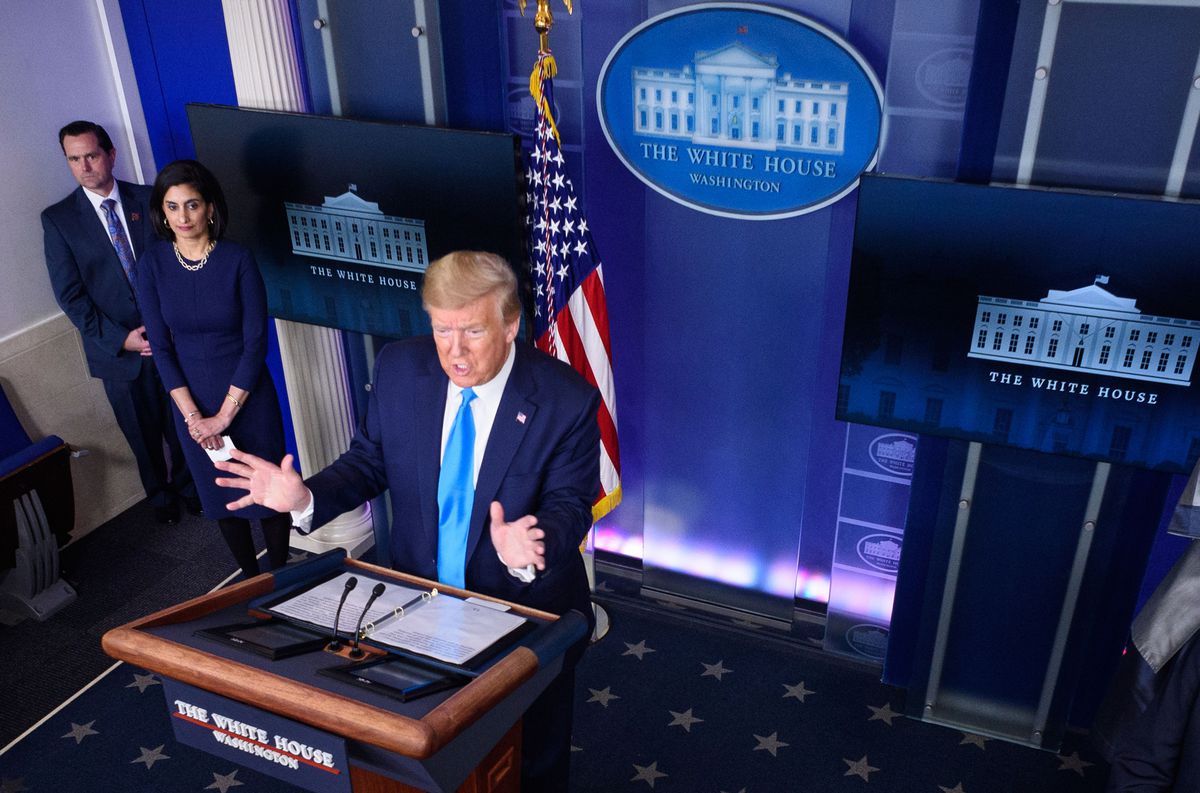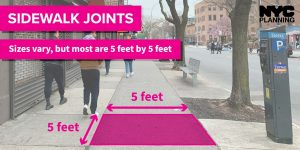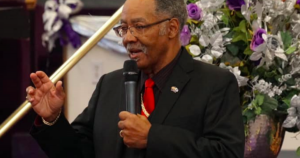The latest
Illinois Democrats push for national COVID-19 death statistics by race
With deaths in Chicago and Illinois throwing a national spotlight on the COVID-19 pandemic disproportionately affecting black communities, Illinois Democrats in Congress pushed the Trump administration on Tuesday to require the Centers for Disease Control and Prevention to publicly report demographic data.
President Donald Trump promised at a briefing April 7 to have some national race-related COVID-19 statistics in two or three days, but the numbers have yet to materialize.
Sens. Dick Durbin and Tammy Duckworth and the 13 House Democrats from the state signed a letter to Health and Human Services Secretary Alex Azar urging his office to “take action to address the impact of COVID-19 on communities of color — particularly black communities — starting with publicly reporting demographic data of cases and deaths on the Centers for Disease Control and Prevention’s (CDC) website.”
At a White House briefing April 7, Trump was asked if he would require the CDC, or any public or private entity doing testing “to collect that data on the race of the people being tested and the race of the people being treated and the outcomes.”
Trump passed the question to Medicare chief Seema Verma. She said Medicare data will be studied for the past month and “Going forward, we now have a code for coronavirus, so we can actually stratify by demographic information so we can look at race as a factor. We can also look at what the underlying health issues are as well. So we’ll be providing that data very shortly, but we will be doing that analysis.”
Trump said at the briefing, “We’re going to have statistics over the next, probably, two to three days. OK?”
Read the full story from Lynn Sweet here.
News
8:16 a.m. Infectious disease expert awaiting murder trial requests release to research COVID-19
Even before Wyndham Lathem made international headlines as the target of a week-long manhunt that began after his boyfriend was discovered murdered in a River North apartment three years ago, the microbiologist had been world-renowned for his research on the bubonic plague.
Lathem, 45, has been held at the jail without bail since his arrest and lost his position as a professor at Northwestern University’s Feinberg School of Medicine.
But last week, the accused murderer asked a judge to free him on $1 million bail, because he said he has health conditions that will put him at greater risk if he contracts coronavirus — and because his research skills could help save lives.
“With his background and experience, Dr. Lathem is well-suited to advise and participate in studies that are aimed at understanding SARS-CoV-2, the coronavirus responsible for the COVID-19 pandemic,” wrote Dr. William Goldman, chair of Microbiology and Immunology at University of North Carolina, in an email appended to Lathem’s motion. “It would make sense to take advantage of as many experts as possible during this worldwide crisis that is rapidly expanding in scope.”
Read the full story from reporter Andy Grimm.
7:19 a.m. Things to do with your kids while self-quarantining at home
Gov. Pritzker’s stay-at-home-order is set to stay in place until April 30, and Mayor Lightfoot has warned that CPS students may not be back in their classrooms right away.
For parents, that means playing teacher, entertainer and parent all at once, and there are only so many episodes of Paw Patrol a kid can watch.
If your kids crave entertainment — be it exercise, knowledge or social interaction — here’s a list of fun and enriching activities you can do with your kids while you’re at home. And if you’re having difficulty explaining what’s going on in the world to your little ones, the cartoon Dr. Panda has a thorough, kid-appropriate lesson on YouTube.
6:28 a.m. Illinois self-employed, gig workers will get jobless benefits starting May 11
Gov. J.B. Pritzker said Monday self-employed and gig workers in Illinois will get their first COVID-19 jobless benefits starting May 11, blaming the delay on “confusing and very stringent regulations” from the Department of Labor “that attempt to severely limit who can actually qualify.”
Coronavirus pandemic stay-at-home orders triggered massive joblessness, overwhelming the Illinois unemployment system and sparking criticism of the Pritzker administration from people desperate to apply for unemployment compensation.
Pritzker used his daily briefing to discuss urgently needed upgrades to the besieged Illinois Department of Employment Security website and call centers and to lay out a timetable to roll out jobless benefits available for the first time to self-employed individuals.
”The unemployment claims process has been a source of hardship for all too many Illinois residents,” the governor said.
“…Our state unemployment filing systems, which were built a decade ago for a much lower number of claims, simply haven’t kept pace. This was the painful truth that we discovered when unemployment began to spike,” Pritzker added.
New Cases
Analysis & Commentary
7:44 a.m. Why Blacks are hit hardest by COVID-19 — and what that says about health care in America
With COVID-19 claiming more black lives than any other demographic, both here and nationally, conversations the past few weeks with many of my black friends highlight many of the reasons why.
Historical injustices in lack of health care access has NAACP President Derrick Johnson concerned over disparities in who is getting access to testing and treatment.
As a National Institutes of Health study of hospitals that closed between 1987-2007 found, the higher the level of residential segregation and poverty, the higher the likelihood hospitals in those communities had long ago exited. The starkest impact of health care deserts were on black communities.
Blacks represent only 15.4 percent of the 105,768 Illinoisans tested to date; whites, 23.3 percent; Hispanics, 5.86 percent; Asians, 2.25 percent; and other, 4.78 percent, though race was not noted for half of those tested.
With COVID-19 killing blacks at a rate more than twice their population in several states, the need for more information and assistance for black communities during this pandemic is clear, and more importantly, greater access to health care.
Read the full story from Maudlyne Ihejirika.
7:09 a.m. Coronavirus illustrates our failure to create a fair society
The media has just discovered that the coronavirus is far more deadly to blacks and Latinos than to whites. Twice as deadly in New York City, according to the New York Times. Seventy-two percent of the fatalities in Chicago are blacks who constitute about 30 percent of the population. The news is treated as a shocking revelation on the BBC, CNN and CBS and in newspapers across the country.
Why should anyone be shocked? Over 150 years after the abolition of slavery, and over six decades since the end of legal apartheid in this country, America still remains, as the Kerner Commission concluded in 1968, “two societies, one black, one white, separate and unequal.”
The coronavirus does not discriminate, but people do. African Americans and Hispanics are more likely to die because we bear the pre-existing condition known as race.
The reality is harsh and inescapable. African Americans are more likely to be poor, more likely to be unemployed, more likely to lack health insurance, more likely to be arrested, jailed and incarcerated. We live lives of greater stress, in neighborhoods too often scarred by gun violence. The result is a lower life expectancy even before the virus hit. This discrepancy is structural, and it is not accidental. It is, as the Kerner Commission concluded, the direct result of public policy and private prejudice.
Read the full column from Jesse Jackson.
6:12 a.m. America’s security blanket is a doctor named Fauci, not a president named Trump
The day will come when President Donald Trump will announce that the physical separation rules put in place to slow the coronavirus should begin to be lifted, reopening swaths of the economy.
When that day comes, we hope to see Dr. Anthony Fauci standing behind the president, signaling with his presence that the decision is sufficiently based on science, not politics.
For tens of millions of Americans who wouldn’t trust Trump to referee a children’s soccer game, Fauci is the one member of the White House pandemic team who instills confidence. He has fought the good fight behind closed doors, championing science against those who worry more about Wall Street or the president’s reelection prospects. He has been honest in his public statements about what should be done, even at the risk of infuriating Trump.
Which he has.
On Sunday, in a typically terrible move, Trump retweeted a call for Fauci to be fired. The next day, at his Monday press briefing, he then shrugged it off. The retweet — his retweet — “doesn’t matter,” he said, because “that’s somebody’s opinion.”
Maybe Trump figured it out. Canning Fauci would be a political disaster.



















